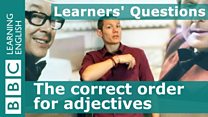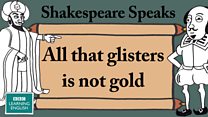Unit 9: English You Need
Exams, news, pronunciation, teachers' tips, learners' questions
Select a unit
- 1 English You Need
- 2 English You Need
- 3 English You Need
- 4 English You Need
- 5 English You Need
- 6 English You Need
- 7 English You Need
- 8 English You Need
- 9 English You Need
- 10 English You Need
- 11 English You Need
- 12 English You Need
- 13 English You Need
- 14 English You Need
- 15 English You Need
- 16 English You Need
- 17 English You Need
- 18 English You Need
- 19 English You Need
- 20 English You Need
- 21 English You Need
- 22 English You Need
- 23 English You Need
- 24 English You Need
- 25 English You Need
- 26 English You Need
- 27 English You Need
- 28 English You Need
- 29 English You Need
- 30 English You Need
Session 5
Learners' Questions
Welcome to Learners' Questions - the series where we answer your queries about the English language. What will this week's learner question be?
Activity 1
Learners' Questions
'Actually', 'in fact' and 'well'
Yukki in Japan asks: Could you please tell me the difference between actually, in fact and well?
Watch the video and complete the activity

Dan
Hi guys! Dan here for BBC Learning English with this week's Learner Question. Find out what it is after this.
OK! This week's learner question comes from Yukki from Japan, who says, "Could you please tell me the difference between actually, in fact and well? I think all of them can be used to correct the previous utterance. Is there any difference between them?"
Well, Yukki, they’re all very similar, but there are slight differences in use. Both actually and in fact can be used to modify or contradict a previous statement. For example, my friend, here, thinks I’m a doctor but in fact I’m a dentist.
Actually and in fact can also be used to introduce more detailed information or to make things clearer or more precise. For example, my friend, here, is so boring that I actually I fell asleep while he was talking to me.
Well is more widely used as a discourse marker than actually or in fact are. It is most often used to indicate that we’re about to say something. And it’s sometimes used to give the speaker more time to think. For example, how much are you looking to spend? Well, about £200.
It can also introduce a statement which shows that expectations have not been fulfilled. For example, have you finished your homework? Well, I’ve half-finished it!
Finally, it can be used to soften corrections or criticisms. For example, you do like my dress don’t you? Well, it’s not your best.
I hope that answers your question, Yukki. Thank you very much for writing. If anybody else out there has a question for Learners’ Questions, you can email us on: learning.english@bbc.co.uk. Please remember to put Learners’ Questions in the subject box and your name and where you’re writing from. We can’t answer every single question, guys, we just get too many, but we do read every single one of them. And, for more information, go to our website: bbclearningenglish.com. That’s it for this week’s Learners’ Questions. I’ll see you next time. Bye!
___________________________________________________________________
Did you like that? Why not try these?
___________________________________________________________________
Summary
Actually and in fact
Both actually and in fact can be used to modify or contradict a previous statement.
He thinks I'm a doctor but in fact I'm a dentist.
Actually and in fact can introduce more detailed information or to make things clearer or more precise.
He's so boring that I actually I fell asleep while he was talking.
Well is commonly used to indicate that someone is about to speak or as a spacer, giving the speaker a little bit more thinking time.
A: How much are you looking to spend?
B: Well, about £200.
Well can also introduce a statement that shows expectations have not been fulfilled.
A: Have you finished your homework?
B: Well, I've half-finished it!
Well can also soften corrections or criticisms.
A: You do like my dress don't you?
B: Well, it's not your best.
To do
Try our quiz to see what you've learned about this topic.
Learners' Questions Quiz
4 Questions
Decide if these sentences are correct or incorrect
Help
Activity
Decide if these sentences are correct or incorrect
Hint
Do we use well when two sentences contradict?Question 1 of 4
Help
Activity
Decide if these sentences are correct or incorrect
Hint
The second person is gently criticising the first person. Should they use in fact?Question 2 of 4
Help
Activity
Decide if these sentences are correct or incorrect
Hint
These two sentences contradict. Can we use actually here?Question 3 of 4
Help
Activity
Decide if these sentences are correct or incorrect
Hint
It doesn't seem like the speaker knows what they want, so they use actually to make time to think. Is this right?Question 4 of 4
Excellent! Great job! Bad luck! You scored:
End of Unit 9
Well, that's it for this unit! Join us again in Unit 10 for Session 1 - Exam Skills, where we will give you some useful tips on how to prepare for exams.
Session Vocabulary
Actually / In fact
Both can modify or contradict.
Both can introduce more detailed information or clarify.
Well
Can indicate someone is about to speak.
Can make create thinking space when talking.
Can introduce a statement where expectations have not been fulfilled.
Can also soften corrections or criticisms.


